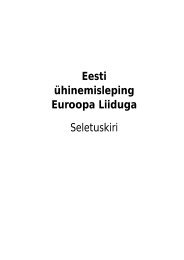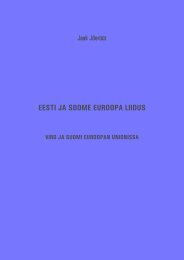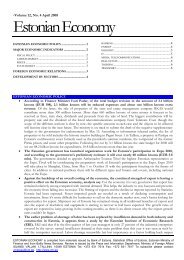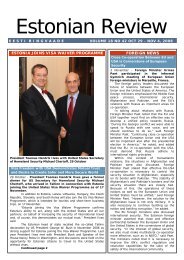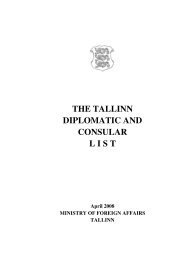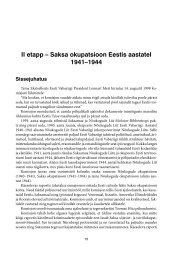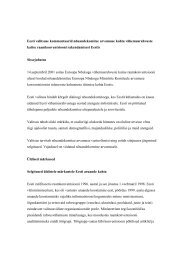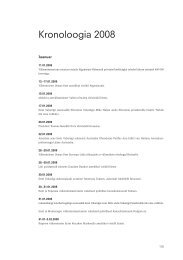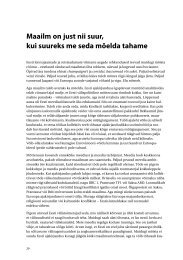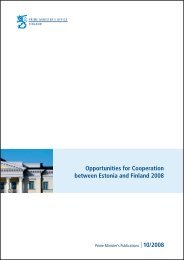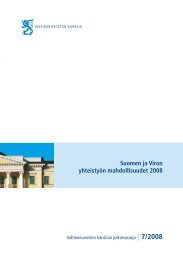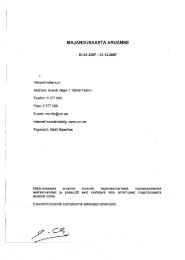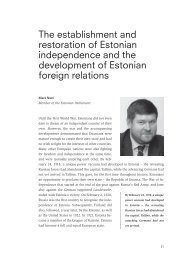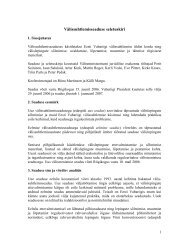The Estonian national security policy in the year 2004
The Estonian national security policy in the year 2004
The Estonian national security policy in the year 2004
You also want an ePaper? Increase the reach of your titles
YUMPU automatically turns print PDFs into web optimized ePapers that Google loves.
<strong>2004</strong> ESTONIAN MINISTRY OF FOREIGN AFFAIRS YEARBOOK<br />
It seems that <strong>2004</strong> was also <strong>the</strong> <strong>year</strong> when we, <strong>Estonian</strong>s, began to fully comprehend<br />
<strong>the</strong> <strong>in</strong>divisibility of world <strong>security</strong>. We have always been aware of <strong>the</strong> dangers that, due<br />
to our geographical location and historical background, constantly “hover over <strong>the</strong><br />
horizon”. But <strong>the</strong>se are more of a <strong>the</strong>oretical nature. We have now had to start deal<strong>in</strong>g<br />
with contemporary and physically concrete threats to our <strong>national</strong> <strong>security</strong>, which unite<br />
us not only with our immediate neighbours, but also with friends much far<strong>the</strong>r away.<br />
<strong>The</strong>se threats are of a global nature, that can be dealt with only if we are firmly united<br />
with o<strong>the</strong>rs -- toge<strong>the</strong>r with our allies <strong>in</strong> NATO and <strong>the</strong> EU, toge<strong>the</strong>r with <strong>the</strong> rest of <strong>the</strong><br />
<strong>in</strong>ter<strong>national</strong> community <strong>in</strong> <strong>the</strong> United Nations Organization. As a matter of fact, NATO<br />
is no longer quite <strong>the</strong> same organization as <strong>the</strong> one that we dreamed of jo<strong>in</strong><strong>in</strong>g at <strong>the</strong><br />
beg<strong>in</strong>n<strong>in</strong>g of <strong>the</strong> 1990s. Ever more time, energy, and resources are devoted, <strong>in</strong> addition<br />
to common defence, to operations that are beyond <strong>the</strong> traditional NATO scope. Be it<br />
participation <strong>in</strong> <strong>the</strong> Afghanistan stabilisation forces or <strong>the</strong> tra<strong>in</strong><strong>in</strong>g of <strong>the</strong> Iraqi military.<br />
<strong>The</strong> development of <strong>the</strong> European Security and Defence Policy, a process, which began<br />
<strong>year</strong>s ago and has had to endure various “stumbl<strong>in</strong>g blocks”, also started show<strong>in</strong>g concrete<br />
results <strong>in</strong> <strong>2004</strong>. For <strong>in</strong>stance, <strong>the</strong> EU took over, from NATO, <strong>the</strong> <strong>in</strong>ter<strong>national</strong> mission <strong>in</strong><br />
Bosnia. In addition to <strong>the</strong> European Rapid Reaction Forces, <strong>the</strong> formation of 1500 member<br />
EU Battle Groups, for deployment <strong>in</strong>to <strong>in</strong>ter<strong>national</strong> crisis cauldrons at 15 days’ notice,<br />
was launched. Estonia has also expressed read<strong>in</strong>ess to participate <strong>in</strong> <strong>the</strong> Battle Groups.<br />
All <strong>the</strong>se developments have, of course, not been without burden for nei<strong>the</strong>r NATO<br />
and <strong>the</strong> EU, nor <strong>the</strong>ir new Member State, with its population of less than 1.4 million.<br />
Ever more efforts are directed at creat<strong>in</strong>g <strong>the</strong> capabilities needed for deal<strong>in</strong>g with <strong>the</strong>se<br />
new challenges. But I am conv<strong>in</strong>ced, that everyth<strong>in</strong>g we are do<strong>in</strong>g <strong>in</strong> connection with<br />
contribut<strong>in</strong>g to <strong>in</strong>ter<strong>national</strong> cooperative endeavours, is also, very def<strong>in</strong>itely, help<strong>in</strong>g to<br />
<strong>in</strong>crease our own <strong>national</strong> <strong>security</strong>.<br />
Unfortunately, <strong>the</strong> <strong>year</strong> <strong>2004</strong> will also rema<strong>in</strong> <strong>in</strong> history as <strong>the</strong> <strong>year</strong> when two courageous<br />
<strong>Estonian</strong> soldiers were killed while serv<strong>in</strong>g <strong>the</strong>ir country abroad. On February<br />
28, Staff Sergeant Andres Nuiamäe was killed <strong>in</strong> Iraq, as was Sergeant Major Arre<br />
Illenzeer on October 25. Estonia has lost two of its f<strong>in</strong>est. Before leav<strong>in</strong>g on his mission,<br />
Arre Illenzeer, <strong>in</strong> response to his mo<strong>the</strong>r’s question as to why he was risk<strong>in</strong>g his life,<br />
declared: “<strong>The</strong> homeland needs defend<strong>in</strong>g.”<br />
In conclusion, some statistics concern<strong>in</strong>g <strong>the</strong> <strong>Estonian</strong>s defend<strong>in</strong>g <strong>the</strong>ir homeland<br />
abroad. At <strong>the</strong> end of <strong>2004</strong>, 174 members of <strong>the</strong> <strong>Estonian</strong> Defence Forces were assigned<br />
to various <strong>in</strong>ter<strong>national</strong> missions: 34 to Iraq, 12 to Afghanistan, 122 to Kosovo, 3 to<br />
Bosnia and Herzegov<strong>in</strong>a, 2 to Israel, and 1 to <strong>the</strong> Central Command <strong>in</strong> <strong>the</strong> United States.<br />
Plus, a highly praised Rescue Board bomb detection can<strong>in</strong>e unit is help<strong>in</strong>g to ensure <strong>the</strong><br />
<strong>security</strong> of Afghanistan’s Kabul airport.<br />
My s<strong>in</strong>cerest thanks to all of <strong>the</strong>m!<br />
12



